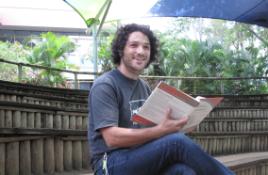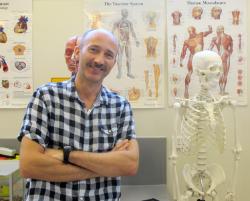CQUni health students can draw on a world of experience
Published on 22 November, 2012
Having developed his skills in Greece, Sweden, Cyprus and Botswana, Dr Anestis Divanoglou has arrived in Rockhampton to help establish a new Physiotherapy degree at CQUniversity.
A convoluted journey is typical for many Allied Health academics who have joined the institution, giving students the chance to learn from educators with experiences in different cultures and countries.

Dr Anestis Divanoglou relaxes on Rockhampton Campus
Anestis' journey started in his home city of Thessaloniki where he first studied Physiotherapy at university, following the example set by his neurologist father and physiotherapist mother.
An exchange program drew him to Stockholm for clinical practice and experience rehabilitating people with spinal cord injuries. Remaining in Sweden, Anestis completed his PhD research at the renowned Karolinska Institute, where he focused on understanding systems of care and clinical outcomes for individuals with a newly acquired traumatic spinal cord injury.
After progressing his academic career in Cyprus and Sweden, Anestis joined a Swedish-led project to educate and train health professionals implementing a spinal unit within a public hospital in Botswana.
"The idea was to standardise and document services so the unit would be sustainable even after the international team had moved on," he said.
Anestis is now looking forward to welcoming the pioneering cohorts of students for the new four-year Bachelor of Physiotherapy program, which will be delivered via campuses in Rockhampton and Bundaberg from 2013 onwards.
"CQUniversity students will have the benefit of connections we are establishing through shared foundation courses with the disciplines of Occupational Therapy, Podiatry and Speech Pathology," he said.
Associate Professor Kenneth Chance-Larsen, who hails from Norway and is now based at Bundaberg as the Discipline Lead for Physiotherapy, said "we are very excited about offering a Bachelor of Physiotherapy program from our Rockhampton and Bundaberg campuses".
"We already have a large number of applications through QTAC, and we are really looking forward to welcoming our first students in Term 1 next year," Assoc Prof Chance-Larsen said.
"Physiotherapy is a popular choice of study, because of the combination of hands-on practical skills, communication and evaluative skills, and physiotherapists provide a really useful service for a wide range of population groups.
"Our program will include a minimum of 25 weeks on clinical placement, where the students will 'learn on the job' whilst supervised by qualified physiotherapists, and this will take place in a variety of settings and locations.
"There is a real and well documented need for physiotherapists in regional, rural and remote Queensland. Local hospitals and private physiotherapy practices can't get enough physiotherapists, and the national workforce data show clearly that people away from the metropolitan areas have vastly inferior access to healthcare, including physiotherapy. Our new program is one little step towards closing the gap!"


